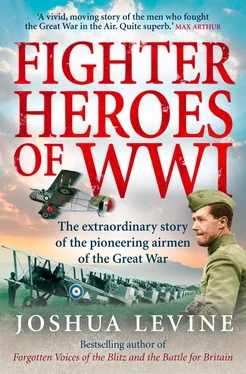We were then sent to take over from another cavalry regiment who had been occupying a trench line in Sanctuary Wood for three days. Our period was to be three days also. The wood was still composed of young larch trees which had been fairly heavily knocked about by rifle fire. The trench had been constructed shortly before by French Territorials. It had been too wet to dig down and the parapet consisted largely of dead French bodies covered over with a superficial covering of earth. There was no wire in front of us. And the German trenches were about thirty yards away. It was here that I received my first utterly trivial wound.
Opposite my troop front – as I say at thirty yards’ range – were the German trenches. And I quickly noticed, looking through a loophole, that opposite me was a place where the German trenches, for some reason, were shallower. And when a man walked along them, he appeared up to about the middle of his upper arm. This seemed to me to offer an opportunity. So I took a rifle from one of my troopers and posted myself at a loophole waiting for the next German to come along.
In due course, the German appeared. I’m a good rifle shot and it was no question that I’d got him. But what I hadn’t realized was that a German was watching the end of my rifle and had a shot at me. And as our trench wall was in no way bulletproof, the bullet hit me under my left arm and merely grazed the skin. But it certainly discouraged me from any further sniping.
We were relieved by the 16th Lancers. I had been convinced from what I’d heard while I was listening in the watches of the night, that the Germans were sapping under our trenches and so I reported to my commanding officer. He reported to brigade and nothing happened. The night after we left, the Germans blew a mine under the very trenches we had been in. And it cost the lives of five or six 16th Lancer officers and about twenty men, partly in a futile counter-attack which ensued from this episode.
Shortly after this, a circular came round all cavalry divisions asking for lightweight – specified lightweight – officers to become observers in the Royal Flying Corps. It came at a very opportune moment for me.
For Walter Ostler, the flying services offered an alternative to the trenches:
I well remember, one night, I was in a very crowded tramcar, going home from Finsbury Park to Wood Green. This lady – if I may call her so – simply pushed up alongside me and stuck this white feather in my buttonhole, much to my embarrassment. It was time to think about service in one of the Forces. For me, it was the Royal Flying Corps because the thing I wanted to avoid most of all was the Army and trench life in France. I’d spoken to soldiers returning from France during the winter of 1914 and they had two words for life out there: ‘Bloody awful.’
T. E. Rogers was an officer who had spent too long in the trenches:
I knew what war was like. I had seen death – too much of it. When I left the trenches, my brother officers said ‘Good heavens, haven’t you seen enough planes come down in flames?’ I said, ‘Yes, but haven’t you seen enough death in trenches?’ With flying, it would soon be over if you’d come to the end of your life. You didn’t have to sleep in mud, night after night, day after day, in mud and water.
When R. J. Duce’s wounds prevented him from continuing in the infantry, he saw the Flying Corps as an opportunity to continue the fight. The path that led him to the RFC began many thousands of miles from France:
I had been in India with one of the merchant banks before the war, and during my five years there, I had joined the equivalent of the territorial force. We were fully trained, to the extent that we were better armed with the Lee Enfields rifle than the British army in England. When the war started, after a little while, a notice came in the clubs, from the Inns of Court Officers Training Corps, asking if we would come home and join, and be commissioned into the British army. I asked the bank if I could go, and they told me that there were other people, senior to me, who should have the choice before me. I pointed out that these people weren’t going. They said that I couldn’t go, but I was going to go, anyway.
I didn’t expect to come out of the war alive. I had been living on the North-West Frontier, up near the Khyber Pass, and I had a lot of nice books and various other things, and I gave them all away, I had the idea, as did a lot of my friends, that I shouldn’t come through it, but I was of a very religious turn of mind, so it didn’t bother me.
I went down to Karachi, and I shipped on board a Japanese boat as a purser. There were forty-nine Chinese crew, six Japanese officers, and an English captain. I paid the captain six shillings a day for my food, and I got one shilling pay when I got to England. The bank sent my resignation after me. Just after I arrived in England, I was stopped, and asked, ‘What about joining up, young man?’ I said, ‘I’ve just come six thousand miles! Give me a chance!’
In the end, I didn’t join the Inns of Court, I joined the Artists Rifles. I was fully trained, so myself and three others, one from India and two from South Africa, were put on as orderlies in the sergeants’ mess. We waited so well on the sergeants that they were delighted. But we wouldn’t take that on permanently. Next, I was made an officer’s servant. Considering that I’d come from India where I’d had eleven servants, it was rather amusing. But then, I was commissioned into the 20th London, Royal West Kent Regiment. In due course, I went out to France.
On my first day in the line, I was on duty – and I remember looking over and seeing that the Germans were shelling from an armoured train that ran along a track. I was so interested to watch the shells suddenly appear like a panther approaching. You could see the shells coming over the last five yards. There was a young fellow there, named Atkins, and I chatted to him for some time. He said to me, ‘Yes, sir, this is my first time in the line.’ And then I walked about twenty yards away from him, to our company dugout, and I looked round, and in that second, a shell came over right on top of him, and the blast blew me down into the dugout. It was quite a first experience.
A while later, we sent over a party of twenty men, their faces blacked, to do a raid. A couple were officers, a few were NCOs and the rest were Tommies. I was in the front line, and a heavy barrage opened up, from behind our second line. We had to keep our heads down in the trench. Then, suddenly the Germans started shelling as well, for all they were worth. Something came down and hit my tin helmet, knocking it off. I picked up the helmet, put it back on, and one second later, something else hit it, and knocked it off again. It showed the value of these helmets. Once the shelling had stopped, we found a strange thing in the back of the trench: one of our own shells had hit a German shell in mid-air, and come down straight behind us in the trench. It should have burst – but it hadn’t.
I don’t know that I ever felt frightened – because I was too dedicated a patriot. And the finest patriot you can get is the Englishman living abroad. Having said that, I remember one incident – we were in France and I was in billets. I had a room by myself, and I woke up in the night to find that I was half hanging out of a dormer window. In my sleep, with the nerves that I must have had, I had thought that I’d been climbing out of the dugout.
At the end of June 1916, we marched down to the Somme. We were detailed to go over the top, in an attack on High Wood. I had No. 5 Platoon, B Company, and we were detailed to go all the way through. I was darned annoyed because I was going over first. We were to go over at 3.15 on Sunday afternoon, and while I was waiting, there was nothing to do but go to sleep, and I found that I was able to sleep at the side of the trench. When we went over, I was quite fortunate. Of the three officers of my company, two were killed and I was only wounded. Out of 480 men, 160 were killed, 160 were wounded and 160 got through. It was rather extraordinary. As I was stepping over the wire, I was shot straight through the foot, which knocked me down. If I’d put my foot down before, I’d have got it right through the knee. I laid out there for some hours, and then as I started to crawl back, parallel to the German line, a German came over the top, and stood, looking out, holding his machine gun. I just had to freeze. I can tell you, it’s quite a nervous tension to lie there for ten minutes, without moving, so that he thinks you’re a dead body. Gradually, I turned my head round to look, and saw that he had gone, and I crawled back. As I was crawling back, I followed a small trench, in which I came across a dead man. All I could do was crawl straight over him. It wasn’t a pleasant thing.
Читать дальше












